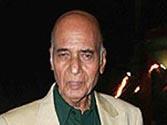Music maestro Khayyam’s name stands among the rare few who gave Hindi cinema music that will forever echo through time. His melodies, steeped in emotion and poetic restraint, have earned him a place in the pantheon of immortals. On February 18, as the nation remembers him, Glamsham.Com revisits the extraordinary journey of a man whose obsession with music once led him to enlist in the Indian Army.
At first glance, it is hard to imagine that the gentle and soft-spoken Khayyam ever donned a soldier’s uniform. Yet he did—serving in the Indian Army for two years, not out of compulsion, but to sustain his passion for music.
Born Mohammad Zahoor Khayyam Hashmi in Punjab’s Nawanshahr district, he was raised in a deeply academic household with four brothers and a sister. His eldest brother, Ameen, managed the family’s transport business; Mushtaq later became General Manager of PIA; Gulzar Hashmi, a talented poet, passed away young. But it was Khayyam—the youngest—who broke tradition, leaving home after the fifth standard to follow the calling of music. “Music has been my passion since childhood,” he once said, “and for music, I even sacrificed my education.”
Encouraged by his maternal uncles, he went to Mumbai, where he was introduced to classical music genius Baba Chishti. “Baba was very kind,” Khayyam recalled. “He told me he’d take me as his student, but he couldn’t pay me anything. He’d only provide food, lodging, and clothes. I immediately agreed.”
For months, Khayyam immersed himself in music under Baba Chishti’s guidance. But survival was difficult without money. Friends often paid for his meals, and the burden of dependence weighed heavily. One night, he traveled back to his hometown to ask his elder brother Mushtaq for help. “I told him I was training under Baba Chishti,” Khayyam said. “He asked how much I was being paid. I said, ‘Nothing.’ Before I could finish, he slapped me. ‘You’ve become a servant without money or education!’ he shouted.”
That humiliation left a deep scar. Vowing never to ask for help again, Khayyam returned to Lahore and chanced upon a newspaper advertisement recruiting young men for the Indian Army. The pay was decent, the uniform honorable—and most importantly, it offered a way to earn enough to continue his dream. He joined as a sipahi and served two years with quiet dedication, saving every rupee he could. When he finally returned to Mumbai, it was with a soldier’s discipline and an artist’s soul.
What followed was a journey that defined the golden age of film music. From Footpath, Phir Subah Hogi, Shola Aur Shabnam, and Heer Ranjha to Shagun, Aakhri Khat, and Mohabbat Isko Kehte Hain, Khayyam’s compositions reflected purity, subtlety, and poetic grace. Ironically, he had once dreamed of becoming an actor, but music soon became his true stage.
Though his career saw ups and downs, his dear friend B.R. Chopra revived it with Kabhi Kabhie (1976). The haunting refrain “Main Pal Do Pal Ka Shayar Hoon” came from Sahir Ludhianvi’s own poetry collection. Khayyam recalled, “Yash Chopra wanted to include the poem but hesitated to ask. Since Sahir was my friend, I persuaded him. He agreed, saying, ‘Aap itna kehte hain to de deta hoon.’ After that, he fondly called me Veer—elder brother.”
After Razia Sultan (1983), directed by his close friend Kamal Amrohi, Khayyam took a long hiatus. His comeback was expected with Goutam Ghose’s Yatra, but controversy clouded its release. He continued composing selectively, including the ghazal album Zah-e-Naseeb by Anita Singhvi, and music for the television serial Bikhri Aas Nikhri Preet, written by Lekh Tandon. His later works included Main Phir Aaoonga and 1918: A Love Story, based on Munshi Premchand’s Bazaar-e-Husn. “By composing its music,” he said, “I feel I’ve repaid my debt to Premchand ji.”
Even in his twilight years, Khayyam remained vocal about the state of contemporary music. “Not all music today is bad,” he said. “I like Ismail Darbar despite his harsh words for me once. But these remixes—they’re shor-e-badtameezi (noisy indecency)! They call it revival, but we’re not dead yet.”
Married to yesteryear singer Jagjit Kaur, remembered for Tum Apna Ranjh-o-Gham, Khayyam hinted at working on an album with her, even in his later days. Gentle, humble, and steadfast, Khayyam embodied an era where melody had meaning. His life—like his music—was about discipline, dignity, and devotion to art. He may have joined the army to survive, but in doing so, he became a general of melody, leading generations into a world where silence itself could sing.

